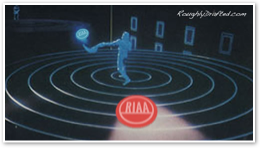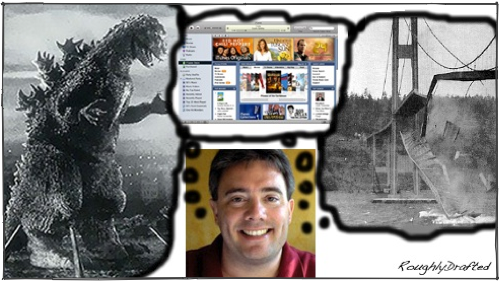
Myth 4: The iTunes Monopoly Myth
Myth 4: The iTunes Monopoly Myth
This myth is of the self-canceling type. From one side of their mouth, analysts of all stripes bemoan Apple's supposed monopoly hold on digital downloads.
The same analysts also pretend to believe that iTunes doesn't matter because only a minority of people are even buying online music, particularly in comparison to the established market for CDs. So which is it?
And what about Microsoft? No, not the monopoly Microsoft was found to be abusing in desktop operating systems, which was resolved by dropping the case and ignoring anything ever happened; no, what about Microsoft and the wide swath of industry participants contributing to a major competitive effort against iTunes?
How can a monopoly be held in a hotly contested, competitive market where larger rivals offer more choice and have unfettered access to retail shelves and end users?
The Fallout
The foremost opponent to the supposed iTunes monopoly is Paul Thurrott, who wrote "Apple should be stopped before the abuses get too great and harm too many consumers!"
He was referring to political action pushed by Virgin in France, which accused Apple of monopolizing the market for digital music in Europe.
The US DOJ supported Apple, stating that Apple's success comes in a healthy market with open competition.
Thurrott sided with Virgin--a Microsoft partner in the failed PlaysForSure initiative--and European bureaucrats seeking to regulate the economy to favor Microsoft’s unpopular PlaysForSure partner stores.
In addition to the PlaysForSure industry consortium dominated by Microsoft, there is also competition from consumer electronics heavyweight Sony, as well as open stores that offer unrestricted MP3 downloads.
Where is the monopoly, and where's the abuse? Apparently Thurrott thinks Microsoft's failure is a threat to consumers. Perhaps he's got it backwards, as usual.
The Myth, Unwoven
RoughlyDrafted presented the The iTunes Monopoly/Failure Myth, showing what monopolies are, why they are sometimes permitted, but why they are generally considered a bad thing when competition is possible.
A follow up article, Why iTunes Works, showed why Apple's current strategies are working to incite competition, not to manipulate the market to prevent any, as a monopolist would.
The next article in the series, Why Microsoft Can't Compete With iTunes, compared Apple's iTunes with Microsoft's monopoly maintenance of Windows, demonstrating how Apple's competitive efforts have enabled the company to outmaneuver the larger Microsoft, despite its entrenched position with Windows.
 The Secret Failures of Microsoft described how Microsoft's reliance on monopolistic practices won't help it in the consumer electronics industry, while The Danger of DRM and The Two Faced Monster inside Zune outlined why its efforts to establish abusive DRM have backfired.
The Secret Failures of Microsoft described how Microsoft's reliance on monopolistic practices won't help it in the consumer electronics industry, while The Danger of DRM and The Two Faced Monster inside Zune outlined why its efforts to establish abusive DRM have backfired.Hiding the Damages
The argument that iTunes constituted an abusive monopoly was countered by a followup Apple attack story which insisted that iTunes wasn't selling enough tracks to matter, citing data from Jupiter Research.
Mark Mulligan of Jupiter Research clarified that the data in his report on iTunes sales was taken out of context to fuel sensationalism.
Mulligan actually found that while few music player owners were regularly buying music online, iPod users are more likely to buy legal music downloads than users of competing products, particularly Microsoft's PlaysForSure platform. In other words, the emerging market for digital downloads is brand new, and Apple's clearly leading it.
That attack blew over, only to be reinvented by the Register a few months later, creating enough of a resulting blog spasm to qualify as a new myth in itself.
Next Article:
This Series









Saturday, December 30, 2006


 Bookmark on Del.icio.us
Bookmark on Del.icio.us Discuss on Reddit
Discuss on Reddit Critically review on NewsTrust
Critically review on NewsTrust Forward to Friends
Forward to Friends
 Get RSS Feed
Get RSS Feed Download RSS Widget
Download RSS Widget





